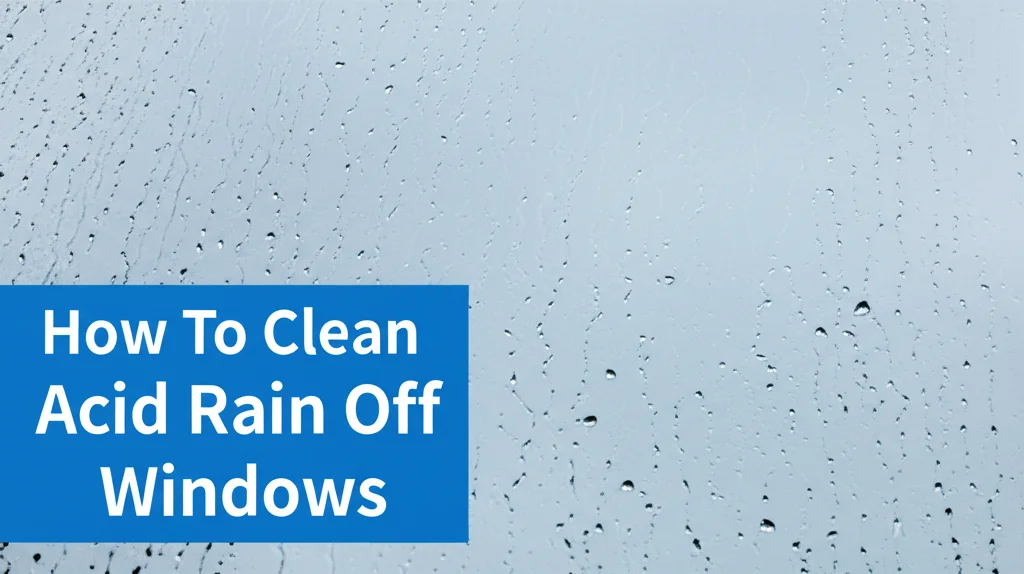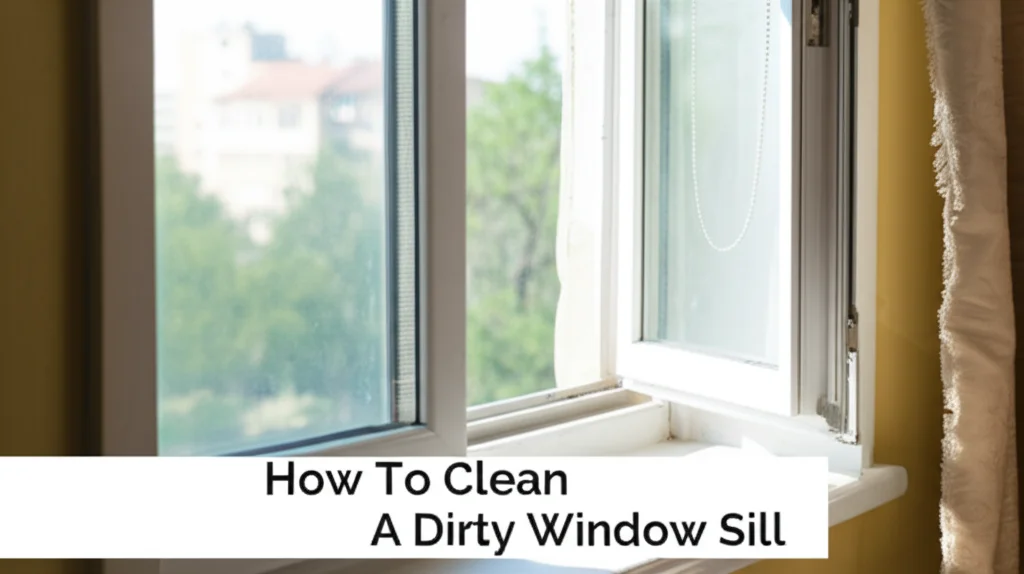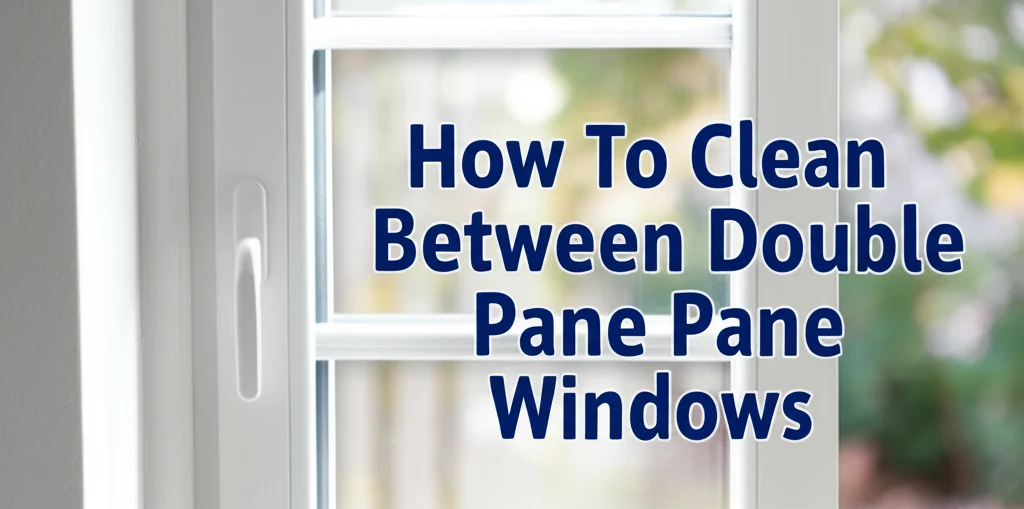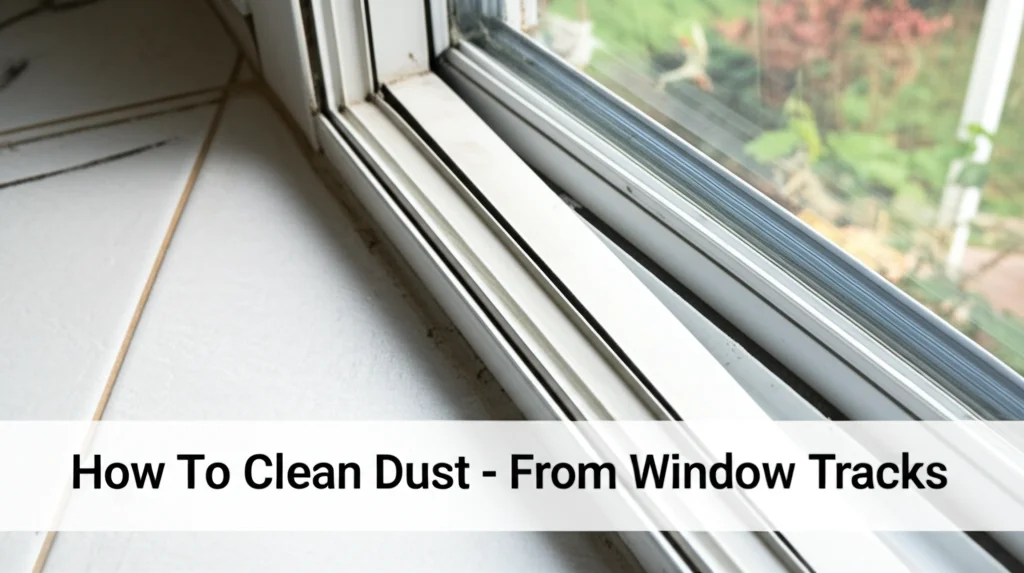· Home Cleaning · 7 min read
How To Clean Acid Rain Off Windows

Cleaning Windows After Acid Rain: A Simple Guide
Have you noticed a hazy film on your windows after a rainstorm? It might be more than just dirt – it could be the effects of acid rain. Acid rain, caused by pollution in the atmosphere, can etch into glass surfaces, leaving behind unsightly spots and streaks. Don’t worry, though! Cleaning acid rain off windows is achievable with the right techniques and tools. This article will guide you through everything you need to know to restore your windows to their sparkling best. We’ll cover identifying acid rain damage, the best cleaning solutions, preventative measures, and when to call a professional.
Quick Answer: To clean acid rain off windows, start by rinsing with plain water to remove loose debris. Then, use a solution of mild dish soap and water, or a commercial glass cleaner specifically designed for hard water spots. Gently scrub with a soft cloth or sponge, rinse thoroughly, and dry with a microfiber cloth to prevent streaks.
Takeaway:
- Rinse windows with water first.
- Use mild soap or a dedicated glass cleaner.
- Dry with a microfiber cloth for a streak-free finish.
Understanding Acid Rain and Its Impact on Windows
Acid rain isn’t a new phenomenon, but its effects on our homes, especially windows, are often underestimated. It forms when pollutants like sulfur dioxide and nitrogen oxides react with water, oxygen, and other chemicals in the atmosphere. This creates a weak acid that falls to the earth as rain, snow, fog, or dry deposition. The pH level of normal rain is around 5.6, while acid rain typically has a pH level between 4.2 and 4.4.
This acidity can cause noticeable damage to glass over time. You might see etching, pitting, or a cloudy film that’s difficult to remove with standard cleaning methods. Ignoring this damage can lead to further deterioration, potentially requiring window replacement. Understanding the source of the problem is the first step in effectively addressing it.
Identifying Acid Rain Damage on Your Windows
Before you start cleaning, it’s important to confirm that the damage is actually caused by acid rain. Sometimes, what looks like acid rain damage is simply hard water stains or general grime buildup. Look closely at your windows. Acid rain damage often appears as a consistent, widespread etching or pitting across the glass surface.
Here are some key indicators:
- Cloudy Film: A persistent, hazy film that doesn’t come off with regular cleaning.
- Etching: Tiny, almost invisible scratches or pits in the glass.
- Streaking: Streaks that reappear quickly after cleaning.
- Uneven Appearance: The glass may look uneven or distorted in certain areas.
If you suspect acid rain damage, test a small, inconspicuous area with a glass cleaner designed for hard water spots. If the cleaner doesn’t remove the damage, it’s likely acid rain etching. You can also compare the affected windows to windows that are more sheltered from the rain.
The Best Cleaning Solutions for Acid Rain Damage
Now that you’ve identified the problem, let’s talk about solutions. Several options can effectively clean acid rain off windows, ranging from DIY mixtures to commercial products. The key is to choose a solution that’s strong enough to dissolve the acid residue but gentle enough not to cause further damage to the glass.
DIY Cleaning Solutions
- Dish Soap and Water: A mild solution of dish soap and warm water is a good starting point for light acid rain residue. Mix a few drops of dish soap into a bucket of warm water and apply with a soft cloth or sponge.
- Vinegar and Water: White vinegar is a natural acid that can help neutralize the effects of acid rain. Mix equal parts white vinegar and water in a spray bottle. Spray onto the windows, let it sit for a few minutes, and then wipe clean. You can find more information on using vinegar for cleaning at https://www.beacleaner.com/how-to-clean-hardwood-floors-with-vinegar/.
- Baking Soda Paste: For more stubborn stains, create a paste of baking soda and water. Apply the paste to the affected areas, let it sit for 10-15 minutes, and then gently scrub with a soft cloth.
Commercial Glass Cleaners
- Hard Water Spot Removers: These cleaners are specifically formulated to dissolve mineral deposits and etching caused by hard water and acid rain.
- Glass Polishing Compounds: For severe etching, a glass polishing compound may be necessary. These compounds contain mild abrasives that can help smooth out the glass surface.
Step-by-Step Guide to Cleaning Acid Rain Off Windows
Let’s get practical. Here’s a step-by-step guide to cleaning acid rain off your windows:
- Rinse with Water: Begin by rinsing the windows with plain water to remove loose dirt and debris. A garden hose with a spray nozzle works well for this.
- Apply Cleaning Solution: Choose your preferred cleaning solution (DIY or commercial) and apply it to the windows.
- Gentle Scrubbing: Use a soft cloth, sponge, or microfiber pad to gently scrub the windows. Avoid using abrasive cleaners or scrub brushes, as these can scratch the glass.
- Rinse Thoroughly: Rinse the windows thoroughly with clean water to remove all traces of the cleaning solution.
- Dry with Microfiber Cloth: Dry the windows with a clean, dry microfiber cloth to prevent streaks. Microfiber cloths are excellent at absorbing water and leaving a streak-free finish.
Preventing Future Acid Rain Damage
Cleaning acid rain off windows is important, but preventing future damage is even better. Here are some steps you can take to protect your windows:
- Protective Coatings: Apply a glass sealant or protective coating to your windows. These coatings create a barrier that helps repel acid rain and other pollutants.
- Regular Cleaning: Clean your windows regularly to remove dirt and debris that can exacerbate the effects of acid rain.
- Overhangs and Awnings: Install overhangs or awnings to shield your windows from direct exposure to rain.
- Consider Window Film: Window film can offer a layer of protection against UV rays and acid rain, while also improving energy efficiency.
When to Call a Professional Window Cleaner
While many cases of acid rain damage can be handled with DIY methods, some situations require professional help. Consider calling a professional window cleaner if:
- Severe Etching: The etching is deep and widespread, and DIY methods aren’t effective.
- High Windows: The windows are difficult or dangerous to reach.
- Large Areas: You have a large number of windows to clean.
- You’re Unsure: You’re unsure about the best cleaning method for your windows.
A professional window cleaner has the expertise and equipment to safely and effectively clean acid rain damage without causing further harm to your windows. They can also assess the extent of the damage and recommend appropriate preventative measures. If you’re dealing with other floor cleaning issues, you might find helpful information at https://www.beacleaner.com/how-to-clean-floor-grout-without-scrubbing/.
Frequently Asked Questions (FAQs)
Q: Can acid rain permanently damage my windows? A: Yes, prolonged exposure to acid rain can cause permanent etching and pitting of the glass surface. While cleaning can improve the appearance, it may not fully restore the original condition.
Q: Is acid rain worse in some areas than others? A: Yes, acid rain is more prevalent in areas with high levels of industrial pollution and near power plants that burn fossil fuels.
Q: How often should I clean my windows to prevent acid rain damage? A: Cleaning your windows every few months, or more frequently in areas with high acid rain levels, can help prevent buildup and minimize damage.
Q: Are all glass cleaners safe to use on acid rain-affected windows? A: No, avoid using abrasive cleaners or those containing harsh chemicals, as these can worsen the etching. Opt for mild dish soap, vinegar, or commercial glass cleaners specifically designed for hard water spots.
Conclusion
Cleaning acid rain off windows doesn’t have to be a daunting task. By understanding the causes of the damage, choosing the right cleaning solutions, and taking preventative measures, you can keep your windows sparkling clean and protect them from further deterioration. Remember to start with a gentle approach, and don’t hesitate to call a professional if you’re dealing with severe etching or difficult-to-reach windows. Protecting your windows from acid rain is an investment in the longevity and beauty of your home. Regular cleaning and preventative maintenance will ensure you enjoy clear views for years to come.




